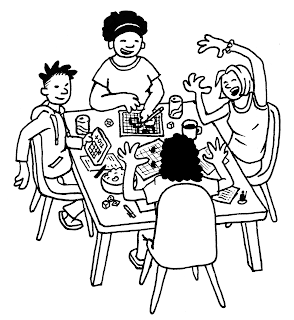Get a totally new game to your table next week
Last week I ran the Wildsea. Next week I'll run Mythic Bastionland. The week after I'll run The Electrum Archive. A week ago I hadn't read any of the games' books, and some weeks I only have an hour's worth of reading time. Here's how to get a game to the table quickly, with a twist at the end.
 |
| Illustration by Hairic under CC4.0 |
1. Don't read the book cover-to-cover.
Go straight to the index, glossary and play sheets (such as character sheets, GM sheets and a quick rules reference). The more RPGs you've played, the more you'll already be familiar with the concepts of a new one. Ignore sections you're already familiar with, and ignore sections that you can avoid during your first session.
2. Ignore sections that you can avoid during your first session.
D&D5e has separate 'play modes': exploration, travel, downtime and combat. If you're in a pinch, you could skip the sections on travel and downtime and start your session by locking your players in a dungeon. Some other ways to skip parts if you need or want to:
- Look for pre-fabricated character sheets to skip reading the sections on Character Creation. Good pre-fabricated characters show the players what a character looks like that lets you get the most out of the game.
- Look for a starter one-shot to skip reading many of the GM sections on creating an adventure.
3. Use a starter one-shot
A good starter one-shot is a great way to start playing a new game, because it teaches you what a good adventure looks like for this game specifically, and how to run it. If the one-shot tries to showcase more parts of the game than you're willing or able to prepare, see if you can cut some parts. Also, keep in mind that not all starter adventures are made equally. Some require more time to prep than it woud for you to make up a scenario yourself. In that case just do the latter.
4. Test that you know the game from the player's side
Players aren't going to ask you about the rules that are exclusively meant for the GM. They want to know what their goal is, what's in their way and what's at their disposal. So take a character sheet and think of the most likely ways in which it might get used and attacked. Once you know how to resolve those situations, it's time to play.
5. Let players know that you don't know
When you run the game, don't hide the fact that you're still exploring the game yourself. Just let everyone know up front that "Hey, we're going to get to know this game, myself included. I don't know everything yet, so at some point I might say that I don't know what the book has to say on this situation, and that I'll make a ruling for now and we can look it up later."
6. Read the book cover-to-cover.
Here's the twist of this post. It is not about getting a game to the table quickly. It is about learning a game effectively. The best way to learn something is by using it. I don't try to learn games effectively because I want to run them soon. I try to run games soon because I want to learn them effectively. Once you've played the game, now you can really sit back and enjoy the book while understanding from experience what it is trying to tell you.
You'll likely have often heard about a session 0, but what about a try-out session even before that? A session with one-off characters and a one-off adventure, just to get a feel for the game in motion before you all commit to setting up a whole campaign for a game you don't have any experience with yet. This post is my plea for a session minus one.
You could even tie the try-out characters and their adventure into your campaign set-up as NPCs. I've seen a one-shot where everyone died, and the next adventure was about the group of player characters investigating the scene where these previous characters died. Everything's connected!
I hope you enjoyed reading this, and that it may inspire your next game in some way! If you are interested in my upcoming RPG projects, subscribe to my mailing list here.
%20(1).png)

.png)
Comments
Post a Comment